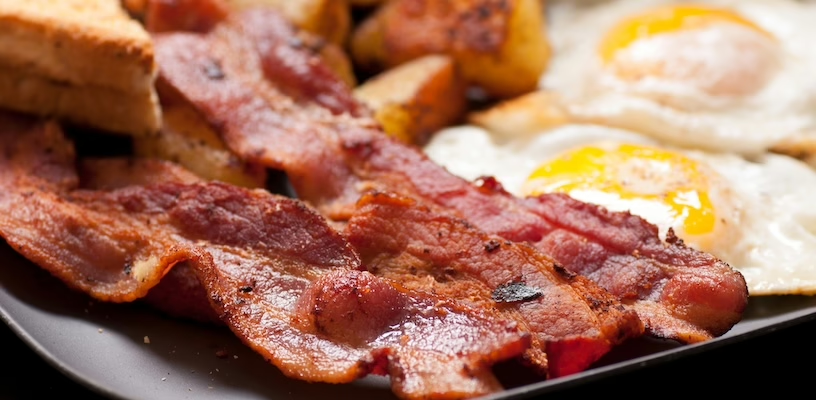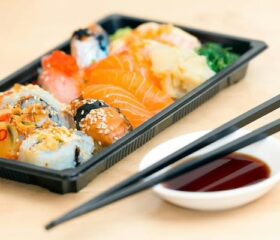Can Pregnant Women Eat Bacon? Risks and Safety Tips
That bacon craving can hit hard during pregnancy, but is bacon safe to eat when you’re carrying a child?

Bacon is delicious, and that smoky, salty flavor and crispy texture can be incredibly appealing when you’re pregnant. However, pregnancy comes with a whole host of dietary considerations, with many popular foods becoming unsafe to eat.
Fortunately, you don’t have to deny yourself bacon completely. Here’s what you need to know about the risks and safety considerations of eating bacon when you’re expecting.
Is bacon safe to eat during pregnancy?
Yes, bacon is safe to eat when you’re pregnant, as long as you prepare it responsibly. There isn’t anything in it that makes it a complete no-go (in contrast to, e.g., seafood that’s high in mercury, which is at the top of the list of foods to avoid during your pregnancy).
However, that doesn’t mean you should go nuts. Even though bacon is safe, it isn’t a very healthy addition to your pregnancy diet. In particular, it’s very high in saturated fats, which means it’s best enjoyed in moderation. 1
While some fat is essential for a healthy pregnancy, excessive saturated fat in your diet can cause a buildup of cholesterol in your arteries, which increases your risk of heart disease and stroke. 2 Too much of these “bad fats” also raises your baby’s chances of having issues with his metabolism and being obese later in childhood. 3
Other risks of eating bacon during pregnancy
Like other processed meats, bacon carries a few other risks depending on how it’s handled, prepared, and cooked:
- Foodborne illness: Raw or undercooked meat can harbor harmful bacteria like listeria, salmonella, and toxoplasma. These pathogens can cause food poisoning and infections that may lead to miscarriage, birth defects, premature delivery, or infant death. 4
- Nitrates and nitrites: Bacon is often cured with nitrates and nitrites, which are chemicals used to preserve the meat—a process which gives it its characteristic pinkish color. 5 6 These compounds may be carcinogenic (cancer-causing) and can cause methemoglobinemia or “blue baby syndrome,” where there’s not enough oxygen in your baby’s blood. 7 8
Again, these risks don’t mean you can’t have bacon, but you do need to be careful about which brand you buy, as well as how you prepare it.
Run your preferred brand of bacon by your doctor
Some brands of bacon contain other additives, such as sugars, maple sugar, wood smoke, flavorings, and spices. 9 On their own, these ingredients may not sound too risky, but you need to ask your doctor how much is safe for you while you’re pregnant. Track how much you’re eating in your journal or a pregnancy tracker app to make sure you don’t go over the limit set by your doctor.
How to enjoy bacon safely during pregnancy
So, how can you enjoy bacon while minimizing the potential risks? It comes down to careful selection, handling, and thorough cooking.
How to shop for bacon during pregnancy
It goes without saying that you should make sure the bacon you pick is fresh and within its expiration date.
You should also look for leaner cuts that have plenty of lean, pink meat marbled throughout, rather than mostly fat. 9 Instead of streaky bacon or smoked bacon, opt for unsmoked back bacon with the fat cut off. 10
Check the ingredient list and be mindful of artificial flavorings, excess salt, or other additives.
If possible, opt for a brand that’s low in nitrates and nitrites, but watch out for bacon that’s labeled “nitrate-free.” Counterintuively, that usually just means it’s made with nitrates and nitrites from natural sources, such as celery, which isn’t necessarily any safer than artificial varieties. 11
How to store and handle bacon properly during pregnancy
Get the bacon into your refrigerator as soon as possible after purchasing it. Follow these guidelines:
- Proper storage: You can store bacon in its original packaging or a sealed container in the refrigerator for up to 7 days (at 40 °F or below), or freeze it for up to one month (at 0 °F). 12
- Cross-contamination prevention: Keep raw bacon and its juices away from other cooked foods and ready-to-eat items like fruits and vegetables. 13
- Thawing: Thaw frozen bacon in the refrigerator, cold water, or microwave. Never thaw it at room temperature, as this can promote bacterial growth and lead to foodborne illnesses. 9
- Hygiene: Wash your hands thoroughly with soap and water before and after handling raw bacon. Clean any surfaces and utensils that come into contact with it with hot, soapy water.
How to cook bacon safely
The most crucial step in enjoying bacon safely during pregnancy is cooking it thoroughly. You can cook bacon on the stovetop (in a skillet or frying pan), in your oven on a foil-lined baking sheet, or even in the microwave.
It’s pretty hard to check the internal temperature of a few slices of bacon to see if they’re cooked, so rely on visual cues. Aim for crispy bacon. This texture indicates it has reached a high enough temperature to eliminate bacteria. 9 Avoid sampling the bacon until it’s fully cooked and crispy.
Finally, don’t cook the bacon halfway and then put it in the fridge for later cooking. Make sure it’s cooked all the way through the first time.
Can you reheat precooked bacon?
Yes, you can reheat bacon. Follow the instructions on the packaging to figure out the best way to do that—or just microwave it. To do that, plop those bacon strips in the microwave on a microwave-safe plate or a sheet of paper towel and microwave for around 10 seconds per strip. 9
How do you make sure bacon’s safe if you’re eating out?
Ordering bacon at a restaurant or food stall can be riskier because you can’t control how thoroughly it’s cooked. If you do order bacon out, ask for it to be cooked extra crispy. If you’re unsure, it’s best to err on the side of caution and skip it.
Bacon alternatives to try during pregnancy
If you’re concerned about the risks associated with bacon or simply want to reduce your intake, several alternatives can satisfy your cravings.
-
- Turkey bacon: Turkey bacon is a popular alternative with less fat and fewer calories than traditional bacon. However, it’s still processed meat, and you should only eat it in moderation. 14
- Soy-based bacon: Fry, bake, or marinate tempeh or tofu in smoky spices to create a plant-based bacon alternative.
- Mushroom bacon: Yes, really—store-bought mushrooms are safe for pregnant women to eat, and all varieties are low-fat and low-calorie. 15 If you marinate and roast them, they can mimic the smoky flavor and texture of bacon.
Alternatively, if you crave salt but want to steer clear of bacon, opt for healthy pregnancy snacks like nuts, whole wheat pretzels, and air-popped popcorn.
When to talk to your doctor about foodborne illness
Even with careful preparation, be mindful of the symptoms of listeria and other foodborne illnesses and infections. If you experience any of the following symptoms after eating bacon, contact your doctor immediately: 16
- Fever or chills
- Diarrhea
- Vomiting
- Pain in your stomach, muscles, or joints
- Headache
- Swollen lymph nodes
Possible signs of severe food poisoning
You may have a particularly severe case of food poisoning if you: 17 18
- Have a high fever (over 102 °F)
- Can’t keep liquids down because you’re vomiting too often
- See blood in your vomit or poop
- Experience diarrhea lasting more than 3 days
- Become dehydrated (the signs of this include infrequent urination, dry mouth and throat, or dizziness when standing up)
Again, seek immediate medical attention, even if you’re sure your bacon (or whatever else you ate) was cooked properly.
Final thoughts
It’s okay to enjoy bacon when you’re pregnant, at least as an occasional treat. By following safe handling and cooking guidelines and by eating it in moderation, you can minimize the risks.
If you’re still concerned, explore bacon alternatives, and remember to check in with your doctor if you develop any troubling symptoms or just aren’t sure if something is safe to eat.
Article Sources
- MyPlate. "Daily Food Guide for Pregnant and Breastfeeding Women" Retrieved September 3, 2025.
- MedlinePlus. "Facts about saturated fats" Retrieved September 3, 2025.
- Family Health Centers of San Diego. "What NOT to Eat During Pregnancy: Foods You Should Avoid While Pregnant and Why" Retrieved September 3, 2025.
- USDA Food Safety and Inspection Service. "Food Safety for Pregnant Women" Retrieved September 3, 2025.
- Agency for Toxic Substances and Disease Registry. "What Instructions Should Be Given to Patients to Prevent Overexposure to Nitrates and Nitrites?" Retrieved September 3, 2025.
- University of Wisconsin–Madison Division of Extension. "What’s the deal with Nitrates and Nitrites used in meat products?" Retrieved September 3, 2025.
- Neurological Health Foundation. "Healthy Child" Retrieved September 3, 2025.
- MedicalNewsToday. "What is blue baby syndrome?" Retrieved September 3, 2025.
- USDA Food Safety and Inspection Service. "Bacon and Food Safety" Retrieved September 3, 2025.
- Tommy’s. "Food swaps to help you eat well in pregnancy" Retrieved September 3, 2025.
- National Public Radio. "Duped In The Deli Aisle? 'No Nitrates Added' Labels Are Often Misleading" Retrieved September 3, 2025.
- FDA Center for Food Safety and Applied Nutrition. "Food Safety For Pregnant Women, Their Unborn Babies, and Children Under Five" Retrieved September 3, 2025.
- USDA Food Safety and Inspection Service. "Washing Food: Does it Promote Food Safety?" Retrieved September 3, 2025.
- Healthline. "Is Turkey Bacon Healthy? Nutrition, Calories and More" Retrieved September 3, 2025.
- The Nutrition Source. "Mushrooms" Retrieved September 3, 2025.
- North Dakota State University. "Safe and Healthy Eating During Pregnancy" Retrieved September 3, 2025.
- Centers for Disease Control and Prevention. "Symptoms of Food Poisoning" Retrieved September 3, 2025.
- Cleveland Clinic. "Food Poisoning" Retrieved September 3, 2025.







